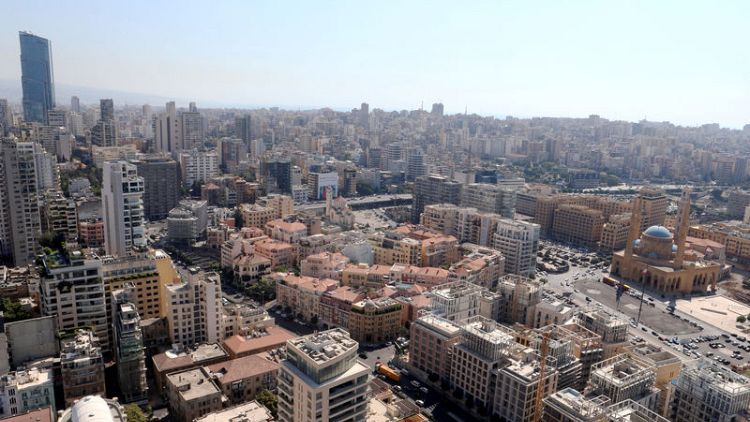BEIRUT (Reuters) - Thousands of people demonstrated in Beirut on Thursday against the Lebanese government's management of an economic crisis in one of the biggest protests in years, leading the Cabinet to pull a proposed new levy on WhatsApp calls.
Protesters blocked roads across Lebanon with burning tyres, broadcasts showed, the second time in less than a month that countrywide demonstrations have broken out in anger at the political elite.
"I was sitting at home and I saw the people on the move and so I came out," said Cezar Shaaya, an accountant protesting in Beirut. "I am married, I have mortgage payments due every month and I am not working. It's the state's fault."
Protesters clashed with security forces near the government headquarters in Beirut, some throwing plastic bottles at riot police. State news agency NNA said two people were wounded.
"The people want to topple the regime," some chanted.
The protests have been fuelled by stagnant economic conditions exacerbated by a financial crisis in one of the world's most heavily indebted states.
The government, which has declared a state of "economic emergency", is seeking ways to narrow its gaping deficit.
A protester burning tyres in the village of Tel Nhas in southern Lebanon said: "We are asking for jobs, for our rights, electricity, water, we are demanding education".
Lebanon faces debt burdens, stagnant growth, crumbling infrastructure and strains in its financial system linked to reduced capital inflows. The Lebanese pound, pegged against the dollar for two decades, has been under pressure.
Prime Minister Saad al-Hariri's government of national unity is seeking to approve a 2020 budget, a step that may help it unlock billions pledged by international donors.
But donors want to see Beirut implement long-delayed reforms to curb waste and corruption.
"We are not here over the WhatsApp, we are here over everything: over fuel, food, bread, over everything," said a protester in Beirut who gave his name as Abdullah.
Crowds were still gathered in central Beirut's Riad al-Solh square into the early hours of Friday, some of them waving Lebanese flags.
Nearby, dozens of young men on motorcycles circled a main crossroad and set tyres on fire, some of them ripping out billboards and tossing wooden panels into the flames.
Interior Minister Raya al-Hassan told Lebanon’s al-Mayadeen TV most of the protests remained peaceful and security was under control.
The education ministry announced schools would close on Friday after the protests.
Earlier, the Cabinet had unveiled a new revenue raising measure, agreeing a charge of 20 cents per day for calls via voice over internet protocol (VoIP), used by applications including Facebook-owned WhatsApp, Facebook calls and FaceTime, Information Minister Jamal al-Jarrah said.
He also said ministers would discuss a proposal to raise value-added tax by 2 percentage points in 2021 and a further 2 percentage points in 2022, until it reaches 15%.
But as protests spread across Lebanon, Telecoms Minister Mohamed Choucair phoned into Lebanese broadcasters to say the proposed levy on WhatsApp calls had been revoked.
Hariri had said the measure was expected to net about $200 million in revenues for the state per year according to a statement from his press office.
Lebanon has only two mobile service providers, both state-owned, and some of the most costly mobile rates in the region.
Finance Minister Ali Hassan Khalil said the draft budget he had submitted to the Cabinet was free of new taxes and he remained committed to passing a budget without new taxes.
(Reporting by Ellen Francis, Suleiman al-Khalidi and Eric Knect and Reuters TV; Additional reporting by Ahmed Tolba in Cairo; Writing by Tom Perry; Editing by Grant McCool and Stephen Coates)
